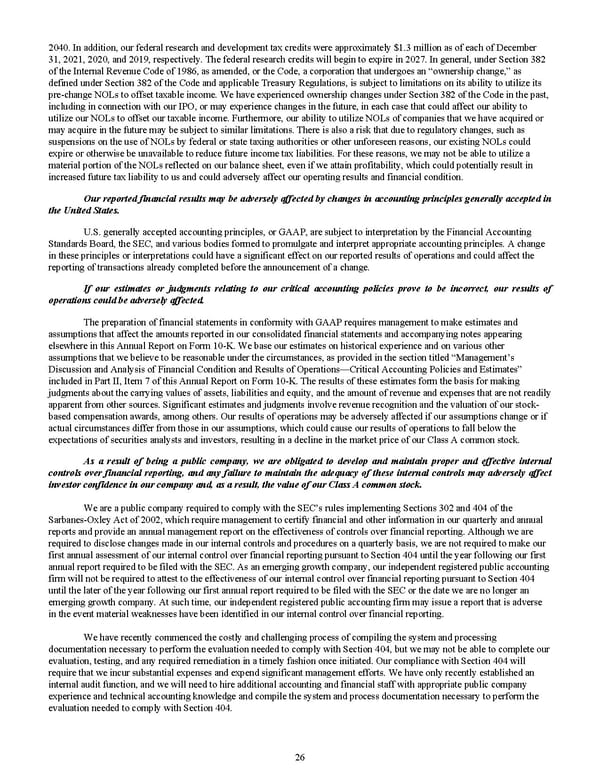2040. In addition, our federal research and development tax credits were approximately $1.3 million as of each of December 31, 2021, 2020, and 2019, respectively. The federal research credits will begin to expire in 2027. In general, under Section 382 of the Internal Revenue Code of 1986, as amended, or the Code, a corporation that undergoes an “ownership change,” as defined under Section 382 of the Code and applicable Treasury Regulations, is subject to limitations on its ability to utilize its pre-change NOLs to offset taxable income. We have experienced ownership changes under Section 382 of the Code in the past, including in connection with our IPO, or may experience changes in the future, in each case that could affect our ability to utilize our NOLs to offset our taxable income. Furthermore, our ability to utilize NOLs of companies that we have acquired or may acquire in the future may be subject to similar limitations. There is also a risk that due to regulatory changes, such as suspensions on the use of NOLs by federal or state taxing authorities or other unforeseen reasons, our existing NOLs could expire or otherwise be unavailable to reduce future income tax liabilities. For these reasons, we may not be able to utilize a material portion of the NOLs reflected on our balance sheet, even if we attain profitability, which could potentially result in increased future tax liability to us and could adversely affect our operating results and financial condition. Our reported financial results may be adversely affected by changes in accounting principles generally accepted in the United States. U.S. generally accepted accounting principles, or GAAP, are subject to interpretation by the Financial Accounting Standards Board, the SEC, and various bodies formed to promulgate and interpret appropriate accounting principles. A change in these principles or interpretations could have a significant effect on our reported results of operations and could affect the reporting of transactions already completed before the announcement of a change. If our estimates or judgments relating to our critical accounting policies prove to be incorrect, our results of operations could be adversely affected. The preparation of financial statements in conformity with GAAP requires management to make estimates and assumptions that affect the amounts reported in our consolidated financial statements and accompanying notes appearing elsewhere in this Annual Report on Form 10-K. We base our estimates on historical experience and on various other assumptions that we believe to be reasonable under the circumstances, as provided in the section titled “Management’s Discussion and Analysis of Financial Condition and Results of Operations—Critical Accounting Policies and Estimates” included in Part II, Item 7 of this Annual Report on Form 10-K. The results of these estimates form the basis for making judgments about the carrying values of assets, liabilities and equity, and the amount of revenue and expenses that are not readily apparent from other sources. Significant estimates and judgments involve revenue recognition and the valuation of our stock- based compensation awards, among others. Our results of operations may be adversely affected if our assumptions change or if actual circumstances differ from those in our assumptions, which could cause our results of operations to fall below the expectations of securities analysts and investors, resulting in a decline in the market price of our Class A common stock. As a result of being a public company, we are obligated to develop and maintain proper and effective internal controls over financial reporting, and any failure to maintain the adequacy of these internal controls may adversely affect investor confidence in our company and, as a result, the value of our Class A common stock. We are a public company required to comply with the SEC’s rules implementing Sections 302 and 404 of the Sarbanes-Oxley Act of 2002, which require management to certify financial and other information in our quarterly and annual reports and provide an annual management report on the effectiveness of controls over financial reporting. Although we are required to disclose changes made in our internal controls and procedures on a quarterly basis, we are not required to make our first annual assessment of our internal control over financial reporting pursuant to Section 404 until the year following our first annual report required to be filed with the SEC. As an emerging growth company, our independent registered public accounting firm will not be required to attest to the effectiveness of our internal control over financial reporting pursuant to Section 404 until the later of the year following our first annual report required to be filed with the SEC or the date we are no longer an emerging growth company. At such time, our independent registered public accounting firm may issue a report that is adverse in the event material weaknesses have been identified in our internal control over financial reporting. We have recently commenced the costly and challenging process of compiling the system and processing documentation necessary to perform the evaluation needed to comply with Section 404, but we may not be able to complete our evaluation, testing, and any required remediation in a timely fashion once initiated. Our compliance with Section 404 will require that we incur substantial expenses and expend significant management efforts. We have only recently established an internal audit function, and we will need to hire additional accounting and financial staff with appropriate public company experience and technical accounting knowledge and compile the system and process documentation necessary to perform the evaluation needed to comply with Section 404. 26
 2022 10K Page 32 Page 34
2022 10K Page 32 Page 34